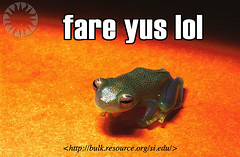I really enjoyed this article about Google buying up the Paper of Record digital news archives and then “disappearing” it somehow. The timeline is a little unclear and it’s back online for now, but as Google figures out how to monetize it and researchers yowl about lack of access, it raises some pretty interesting issues about scholarship. As information ownership changes hands — and I think if we weren’t talking about Google here we’d be talking about someone else, so it’s not really about them — data can literally disappear either behind a paywall or just gone. Particularly poignant in this case is the comment (sorry no permalink) on the Inside Higher Ed story by Bob Huggins the original founder/creator of the archive discussing what’s happening with the archive now.
When exactly does the cat fight end? It slays me to see the great American Us versus Them debate rage on( I comment as a Canadian). As person who pioneered the digitization of newspapers in the world with our company, Cold North Wind, I fail to see how this acrimony between Academics and Google helps ‘joe public’ access the public record. I have stated on numerous occasions that the newspaper represents ‘our’ only record of daily public life for the past 500 years with a special emphasis on the word “public”… I have been through the grinding wheels of both Google and many public institutions whose goal it seems is to preserve and present history from Newspapers. Both have let me down.
